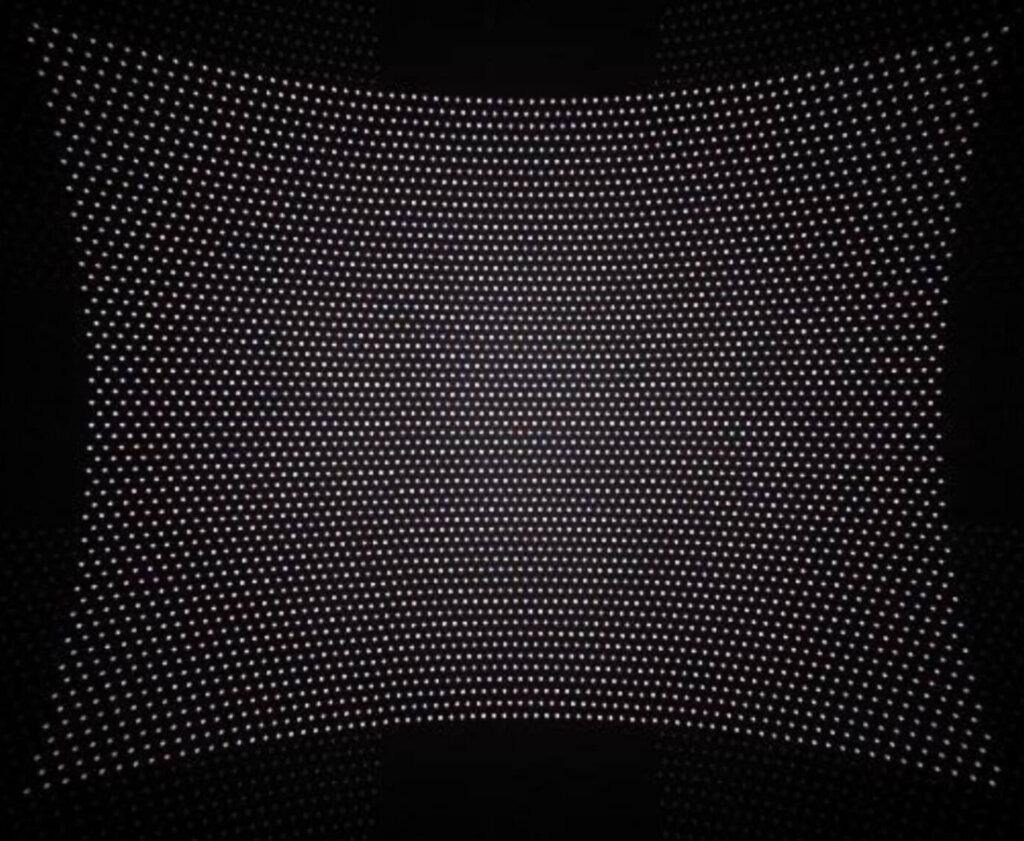NIL Technology (NILT), a leader in advanced optical solutions, is launching its highly advanced flat optics technology platform for near-infrared (NIR) used in 3D sensing and LiDAR. The technology will become a gamechanger for smartphones, automotive, and other applications, due to its multi-functionality, compactness, and unprecedented optical performance.
 Proven dot pattern of 940 nm VCSEL array project through a DOE collimator and 3 x 3 fan-out DOE. Image Credit: NIL Technology ApS
Proven dot pattern of 940 nm VCSEL array project through a DOE collimator and 3 x 3 fan-out DOE. Image Credit: NIL Technology ApS
Since its first introduction for face recognition, 3D sensing has become a highly valued feature for several applications in smartphones, augmented-, virtual- and mixed reality (AR/VR/MR), automotive (ADAS adaptation), and robotics. All these applications require a compact system with high optical efficiency that can be mass produced with consistent quality, a well-known challenge in the optics industry.
Today, NILT is ready for mass production of its diffractive optical elements (DOE) platform that is both flat, thin, and multifunctional. The platform provides better optical performance than any existing solutions on the market and has several advantages: compactness, high efficiency, and mass production ability.
Compactness. NILTs optical solutions include diffusers, fan-outs (also known as dot projectors, beam splitters or structured light) and collimators based on the same technology platform allowing multi-functionality. In other words, one module can be made with multiple optical functions in a single process. This gives an overall size reduction, shortened optical path, simpler integration, and overall a need for fewer optical modules. Traditionally, flood illuminators and dot pattern illuminators require separate modules with a different supply chain. NILT is the first supplier that can provide collimation, flood illumination and dot patterns into one single optical element.
Efficiency. NILT developed proprietary design algorithms to optimize optical efficiency and maximize performance. Full control of zero-order transmission is enabled. Fan-outs for dot illuminators are designed and fabricated for highly consistent dot uniformity with high contrast having no stich effects. Diffusers for flood illuminators have an unmatched sharp transition at the edge of the illumination field to increase the amount of light within the target scene. This gives more precise, less energy consuming and faster 3D images.
Production. Optical components based on NILT’s solutions are already used in global, flagship smartphones. Now, using its validated, reliable, and proven methodology, NILT has developed a unique in-house platform that is based on more than a decade of global customer engagements. The result is a mobile proven solution that is ready for mass production in new flagship mobile phones.
“We foresee a lot of business opportunities for the 3D sensing market,” asserts Zine Bouhamri, PhD. Team Lead Analyst, Imaging & Display from Yole Développement (Yole). “It is not a chimera, for sure. We expect a US$15 billion market in 2026, with a 14.5% CAGR between 2020 and 2026. The mobile, consumer and automotive segments will drive the 3D sensing development with existing and emerging applications.”
Theodor Nielsen, CEO of NILT says: “We have worked closely with selected partners and customers for the last year to develop and fine-tune our DOE technology. We have built full in-house capabilities from design to mass production, which ensures fast and efficient turnaround time on products. This allows us to design for manufacturing from day one. Our concept is to design our optical solutions to match the full system, including models for emitter and sensors, which is part of our uniqueness. I am excited to finally promote the technology widely.”
NILT solutions for 3D sensing are available now. Besides DOE’s, the product portfolio of advanced optical elements, components and modules also include solutions based on metalenses / meta optical components (MOE), as well as AR displays.
Technical specs on the optical performance for the flat, multifunctional optics product platform for 3D sensing and LiDAR can be found on www.nilt.com/multi-functional-3D-optics